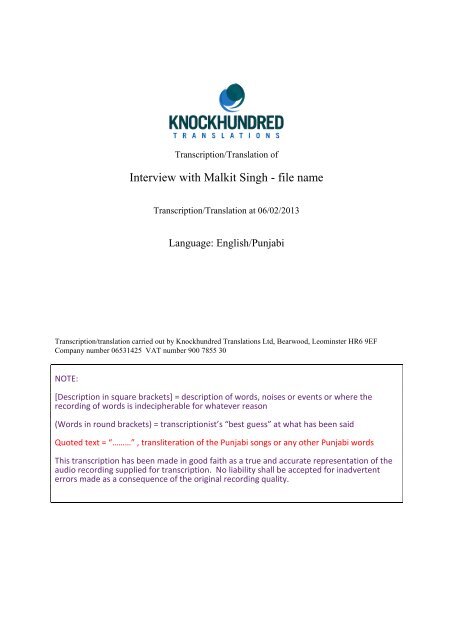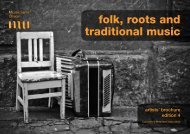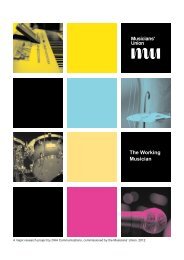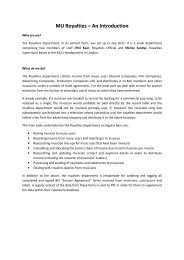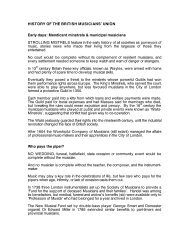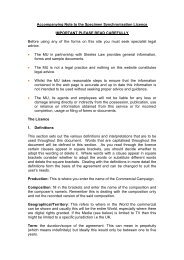Interview with Malkit Singh - file name - Musicians' Union
Interview with Malkit Singh - file name - Musicians' Union
Interview with Malkit Singh - file name - Musicians' Union
You also want an ePaper? Increase the reach of your titles
YUMPU automatically turns print PDFs into web optimized ePapers that Google loves.
Transcription/Translation of<strong>Interview</strong> <strong>with</strong> <strong>Malkit</strong> <strong>Singh</strong> - <strong>file</strong> <strong>name</strong>Transcription/Translation at 06/02/2013Language: English/PunjabiTranscription/translation carried out by Knockhundred Translations Ltd, Bearwood, Leominster HR6 9EFCompany number 06531425 VAT number 900 7855 30NOTE:[Description in square brackets] = description of words, noises or events or where therecording of words is indecipherable for whatever reason(Words in round brackets) = transcriptionist’s “best guess” at what has been saidQuoted text = “………” , transliteration of the Punjabi songs or any other Punjabi wordsThis transcription has been made in good faith as a true and accurate representation of theaudio recording supplied for transcription. No liability shall be accepted for inadvertenterrors made as a consequence of the original recording quality.
Time SpeakerTranscriptCode00:00:01 <strong>Interview</strong>er Thank you so much, I wish I could record that and just take it tomy wife and say, “Look what people are saying about me, lookwhat they’re saying out there.” Now, thank you, each and everyone of you. And thank you very much to Alice as well. Thankyou for coming, it’s beautiful, it’s wonderful to have you allhere. And it is an audience <strong>with</strong> <strong>Malkit</strong> <strong>Singh</strong> and obviouslysome of you are fans and some of you may not know about<strong>Malkit</strong>. But hopefully today what we’re trying to do is to try andget inside of the man actually, where he started from, about hismusic and about what he’s done so far. So presented today by(Shanti) Musician’s <strong>Union</strong> and the Eastern Electronic Festival,we’re live at the Mac in Birmingham. So <strong>with</strong>out further ado, Iknow the man you’re all waiting for, he’s given us some great,great Bhangra tunes and he’s going to share some of his besttunes, hopefully <strong>with</strong> us today as well. The man <strong>with</strong> the goldenvoice, the man <strong>with</strong> the Midas touch, please, can we just putour hands together for the one and only Mr <strong>Malkit</strong> <strong>Singh</strong>.00:00:57 [Applause]<strong>Interview</strong>er Wow.<strong>Malkit</strong> Thank you<strong>Singh</strong>00:01:15 <strong>Interview</strong>er I thought that, I thought Mrs <strong>Singh</strong> is wearing blue so that Mr<strong>Singh</strong> will wear blue as well.<strong>Malkit</strong> I thought we should do matching today, [laughing…]<strong>Singh</strong>00:01:21 <strong>Interview</strong>er There is a great tradition of that <strong>Malkit</strong> bhajee (respectedbrother) that people who wear the star; they wear matching;ladies wear matching scarfs and.. then.. and then men will wearthe same colour. Is that something that comes from Punjab?<strong>Malkit</strong><strong>Singh</strong>Yes, I think; no matter how much you keep wearing suits andties but for tradition, you cannot beat traditional clothes;traditional songs; you know.00:01:42 <strong>Interview</strong>er Yes, I mean; tell us about yourself; you look absolutely; does nothe look brilliant; always shining00:01:46 <strong>Malkit</strong> Thank you.<strong>Singh</strong><strong>Interview</strong>er Always golden; always has a golden.. Tell us before we, sort of,start talking about music; as an artist; as a Bhangra artist; whichis an art in itself: how important it is for you now specially, Imean when you actually started to look so great to PR yourselffor the audience.00:02:07 <strong>Malkit</strong><strong>Singh</strong>Well, I think because, you need nice songs as well; but you needto keep yourself fit as well; because these days it is the age of
video, the millennium, and every time you have to show like 3,4 videos; so every time you need new clothes, you need newlook; so a lot of things.00:02:27 <strong>Interview</strong>er Is there extra expenditure there?<strong>Malkit</strong> Oh yes, there must be<strong>Singh</strong>00:02:29 <strong>Interview</strong>er [Laughing], yes, they are; they are absolutely brilliant.So, who in the family; do you have a certain person in the familywho decides; you know; that you have absolutely unique outfit,children, dad saying this look or Mrs <strong>Singh</strong> saying, “we arehaving this look”. Who is responsible for; for the clothing of Mr<strong>Malkit</strong> <strong>Singh</strong>?<strong>Malkit</strong> Hmm, my wife actually. Give a big hand for my wife; she is here.<strong>Singh</strong>00:02:53 [applause from audience in the background]<strong>Interview</strong>er So, she chooses what you are going to wear?<strong>Malkit</strong> Yes, that is right.<strong>Singh</strong><strong>Interview</strong>er Does she say “you look alright or you may be, you could havegone <strong>with</strong> this colour or may be not <strong>with</strong> that colour”?<strong>Malkit</strong> Oh yes, because you are on…<strong>Singh</strong>00:03:09 <strong>Malkit</strong><strong>Singh</strong>Yes, absolutely, now she has made me ready to come here[laughing sounds from the audience]. She says things like, “notlike that; sit a little bit like this by bringing your tummy in; donot do this”; [laughing..]<strong>Interview</strong>er [Laughing], tuck your tummy in a little bit.. [laughing]Bhajee (respected brother), You know; I think; thank you foryour music; that is what I would like say as being a big fan ofyours.<strong>Malkit</strong> Thank you<strong>Singh</strong>00:03:22 <strong>Interview</strong>er Tell us, how <strong>Malkit</strong> <strong>Singh</strong>, the child from Punjabi, actually, gotinto this industry of music?<strong>Malkit</strong><strong>Singh</strong>00:04:00 <strong>Malkit</strong><strong>Singh</strong>Hmm, well I was only 4 years old; you can say this, as we say inPunjabi; I learnt to speak <strong>with</strong> music and I started my schoolvery young; hmm, my teacher, hmm, my master-jee admittedme in the school when I was 4 years old. You know, in India,actually there were no nurseries at that time so you know,school people did; a child of 6 years old is admitted in a schooland I was only a 4 years old child, when they admitted me in aschool.<strong>Interview</strong>er Because you cannot attend the school until you are 6, Iremember that.Yes, because, hmm, hmm, you know, they liked my songs; theyliked my.. ; I would do like “ho.. ho..” (in a singing tune) when Iwas young.
00:04:15 <strong>Interview</strong>er [Laughing]. Walking around the school?<strong>Malkit</strong><strong>Singh</strong>00:04:22 <strong>Malkit</strong><strong>Singh</strong>[Laughing]. Because, you know the school was next door to ourhouseSo, when I would sing they would listen to it. And the mastersaid we would admit this child to the school early. I think 4.., Iwas 4 years old and I had to stay in the same class one until Iwas 6 years old. So for 2 years I had good rehearsal and I keptpracticing and my teachers kept encouraging me. Then after Ileft that school, you know, I took part in lots of competitions;school’s folk song; every Saturday; we used to do like one hoursession; we used to go there on Saturday to sing. So, that iswhere it all started from, as a hobby.00:05:01 <strong>Interview</strong>er Right, right. What is the first song you heard in your ears? Whowas it sung by? What inspired your thought? Touchedsomething inside your heart.00:05:17 <strong>Malkit</strong><strong>Singh</strong>I always, you know, followed the traditional music; traditionsongs; I liked Manak Shah… such as old Dhadi (folk singer),Shonky Sahib, Didar <strong>Singh</strong> Tanda. So, I actually, we started froma Gurudawara (Sikh Temple); yes, because at that time; I meanevery artist like when he is a young; he is a child; so he needs anaudience so that he can play in front of some people. And westarted in Gurudawara like doing Shabad and Kirtan (like songsof prayer) and then religious songs; so started from a villagefrom Gurudawara. And when I was a young child, people usedto say “he sings very nicely”. We have a programme in ourvillage so you have to come; come to our village as well. So itstarted from there.00:06:09 <strong>Interview</strong>er How did; how did the family feel about you going into singingsongs? Were they encouraging of that or at that time because,you know, it is not that far away but sometime ago.<strong>Malkit</strong> Yes, that time, because, it was not our profession and parents<strong>Singh</strong> always want their child to be a doctor, solicitor or somethinglike that. So that is why my parents also wanted, because,hmm.. I belonged to a Jat (farmer) family and my parentswanted me to be such as a ThaNedar (police officer); our ladshould work for police or should be a Tehsildar (collector ofrevenue), to deal <strong>with</strong> land related things, [laughing].. and..00:06:51 <strong>Interview</strong>er So, as long as it is based around land, around fields, aroundfarmers, that is most important.<strong>Malkit</strong><strong>Singh</strong><strong>Interview</strong>er [Laughing]<strong>Malkit</strong><strong>Singh</strong>Yes, yes, you know in India, parents, they want to feel proud ofwhen going to a police station or to such places.So, yes, in the beginning, they did not like it and after when Iused to bring a shield from my college just like a prize andsomething.<strong>Interview</strong>er I was going to say that though, did they ever think that you
00:07:20 <strong>Malkit</strong><strong>Singh</strong>7:50 <strong>Malkit</strong><strong>Singh</strong>would grow out of it? Slowly, slowly, let him carry on and theneventually he will give up on it.Actually, whenever I used to win and bring a shield or cup thenmy parents felt, yes, there is something special in our lad. So heshould be allowed to sing. From that point slowly slowly ….andup..<strong>Interview</strong>er Yes, I was going to say, when did you or your family took itseriously enough to learn the art of music, where before, youmight be just, sort of, singing openly? You actually learnt it, youknow, properly learnt it.Yes, when I joined the college in Khalsa College, Jalendhar. Sothen I could do, like, professionally music, you know, theteacher, my professor, Manjeet <strong>Singh</strong>, you know, our teacher,music teacher. So a lot, you know… I learnt a lot from him andafter that from university.. I got a gold medal from theuniversity.<strong>Interview</strong>er By singing?<strong>Malkit</strong> Yeah.<strong>Singh</strong><strong>Interview</strong>er Simple as that, easy at that, you got a gold medal.<strong>Malkit</strong> And I won like, three times, for three years continuously, from<strong>Singh</strong> Gurunanak University, Amritsar.00:08:24 <strong>Malkit</strong> Then, I won gold medals from All Entries University, in Punjabi.<strong>Singh</strong><strong>Interview</strong>er Was that just for the one song or was it a variety of songs thatyou won your gold medals <strong>with</strong>?<strong>Malkit</strong><strong>Singh</strong>Actually that time I used sing like, Punjabi Boliyan, Lambiyan (atype of folk song <strong>with</strong> long prases) such as “oh Pindan bichonpind suNida….” (wording of the song) Long boliyan, (the famousvillage among the villages, we hear about)00:08:44 <strong>Malkit</strong> So we used sing that song<strong>Singh</strong><strong>Interview</strong>er You don’t mind a little, sing a song, do you? <strong>Malkit</strong> Bhajeewants to give us a couple of his vocals.00:08:51 <strong>Malkit</strong> [Laughing], yes, yes, if you can give your company by clapping<strong>Singh</strong><strong>Interview</strong>er Yes, that would be quite good.00:08:53 <strong>Malkit</strong><strong>Singh</strong>(Sings the song as) “Oh pindan bichon pind suNida, pind suNidaGardi, bai, othon di ek nar suNidi… hoo..” ( the famous villageamong the villages, we hear about is Gardi and from thatvillage we hear about the lady), [laughing together]“Othon di ek nar suNidi khuh ton paNi bhardi” (The lady fromthat village brings water from the well),“ucha chawara, uchiyan poriyan, sanghal pa pa chardi, lack uhdapatla jeeya” (high build, high stairs, she is climbing <strong>with</strong> the help
of a iron chain, she has a very slim waist),“Gal krandi dardi luk usda patla jeeya” (afraid to say anythingher waist is very slim)00:09:13 <strong>Interview</strong>er Wow, and that’s all it takes to win a gold medal, guys.[Applause] interviewer laughing loudly.00:09:20 <strong>Malkit</strong><strong>Singh</strong><strong>Malkit</strong><strong>Singh</strong>00:09:32 <strong>Malkit</strong><strong>Singh</strong><strong>Malkit</strong><strong>Singh</strong>So we started <strong>with</strong>, like, as we call it “Lambiyan Boliyan”And then “Gurh nalon ishk meetha” (love is sweeter thancandy).I used to sing “Gurh nalon ishk meetha” as, when you know like“Tutak, tutak tutiyan” song came, after that. The song “Gurhnalon ishk meetha”, I used to sing it for a guest appearance.Because when they, children were all sitting to receive thejudgment (decision)They needed, like, 10 to 15 minutes to reach the judgment. Sothen all the girls and all boys would ask to bring me, bring<strong>Malkit</strong> <strong>Singh</strong> on the stage<strong>Interview</strong>er Because the “Gurh nalon ishk meetha”, kind of, became yourtrade mark, kind of, song really, didn’t it?<strong>Malkit</strong><strong>Singh</strong>You know, “Gurh nalon ishk meetha”was popular all over thePunjab even before I recorded the song. Because I used to singit on television, DoorDarshan, Jalandhar, and on radioprograms, and on such other baNi programs (related tolanguage programs) other children’s program and program foryoungsters.So, yes, even before recording the song it was a hit in Punjabthat <strong>Malkit</strong> <strong>Singh</strong> has sung it.00:10:13 <strong>Malkit</strong><strong>Singh</strong><strong>Interview</strong>er And that the Tumbee (musical instrument) plays like ….. [singsthe tune]<strong>Malkit</strong> Yes, absolutely. After that a lot of Hindi films, they copied my,<strong>Singh</strong> you know, my tune, “Gurh nalon ishk meetha”I used to play the00:10:36 <strong>Malkit</strong><strong>Singh</strong>00:10:54 <strong>Malkit</strong><strong>Singh</strong>tune… (plays the tune)Lakhmikant Piyarelal played his violin 17 time on the same piece<strong>Interview</strong>er One Tumbee and 70 violins, there you go, that’s the howpowerful the Tumbee is, isn’t it funny? I mean, the traditionalinstruments, I mean, they’re still, even now, they inspire us somuch. And if you think about the Tumbee, it’s just an Ektar(instrument <strong>with</strong> one wire) really, just <strong>with</strong> one Tar (wire)Absolutely, and the traditional clothing, traditional songs,traditional instrument, we can’t beat like, our traditional beat ofTabla, Dholak, Dhol, all these and our other traditionalinstrument such as Sarangy, when it is played, I think it is in ourblood, the folk music, and the folk instruments when any ofthem is played, no matter how much violin you hear but when aTumbee is played, immediately, ears of us Punjabi become alert
to it. At that moment they start to sing (not clear)00:11:28 <strong>Interview</strong>er That’s very true. Your move to England then, when we first, youknow, the people of England first, sort of, saw you and theGolden Star came up, and that’s how you were announcedactually, “The gold medallist, <strong>Malkit</strong> <strong>Singh</strong>.” That’s what itstarted from, didn’t it? Tell us a little bit about that move toEngland, did you want to come to England or were you okay inIndia, having fun doing “Gurh nalon ishk meetha”, winning goldmedals?<strong>Malkit</strong><strong>Singh</strong><strong>Interview</strong>er She was smitten <strong>with</strong> ..00:12:13 <strong>Malkit</strong><strong>Singh</strong>00:12:30 <strong>Malkit</strong><strong>Singh</strong>00:12:50 <strong>Malkit</strong><strong>Singh</strong>00:13:13 <strong>Malkit</strong><strong>Singh</strong>You know, I was famous everywhere in Punjab. So my wife, shewent to India, like, for a holiday and she came to the college aswell, and attended one of the functions. After seeing thefunction you know what happened after that. [audiencelaughing and clapping]It was a situation over 300 and so….. [laughing]Then things started from there.<strong>Interview</strong>er What was it, was it just a one way thing then? Was it just thatshe looked at you or, as in Bollywood films, you looked at herand then she got the Tumbee out and you got the Dhol out?Yes, it was a situation like in Indian films. So, I moved in Englandin 1984.<strong>Interview</strong>er Right. You know, welcome to England, thank you for coming toEngland. I think you almost, well, you did, kind of, change theface of Bhangra music because you came in <strong>with</strong> that traditionallook and the traditional style.Sukhi (interviewer’s <strong>name</strong>), I am the only artist who, you know,even started <strong>with</strong> the traditional music and to record thattraditional music as well. I think, you hmm, up to today, up tonow, even now, if you pick up an album and see, that therewouldn’t be a single album <strong>with</strong> Tubmee, Dhol and Harmonium.We recorded our first album <strong>with</strong> the three instruments.Which was (famous) all over the world.. it had “Gurh nalon ishkmeetha”, “Nach gidhe wich” and “kuri kinni soNi” and manyother songs. The album became very popular all over the world.<strong>Interview</strong>er I mean, how did that move from Punjab to the UK, thenobviously moving on to the music scene. Tell us about that abit, was it a struggle time for you as a musician? Or was it easyfor you because the band was made and obviously Tirlochan<strong>Singh</strong> built up the alliance, and he already was, sort of, in theindustry? So was it an easier transition for you?<strong>Malkit</strong><strong>Singh</strong>00:13:58 <strong>Malkit</strong><strong>Singh</strong><strong>Malkit</strong>Yes, when I came here, you know, I used to watch the music(show), you know, and the people would start dancing beforethe singer had started to sing.Only the tune had started to play and people would get up andstart dancingBut, I always like, like, traditional songs and serious songs as
<strong>Singh</strong> well, meaningful songs and family songs, so there wassomething in me like making people sit and making them listento music. People would sit down and then I would play Tebla,Bazza; our son Mindi is very good, had I known before I hadbought Tabla <strong>with</strong> us.00:14:23 <strong>Interview</strong>er Is he a Tabla master, is he? All right, okay.00:14:26<strong>Malkit</strong><strong>Singh</strong>00:15:00 <strong>Malkit</strong><strong>Singh</strong><strong>Malkit</strong><strong>Singh</strong>00:15:33 <strong>Malkit</strong><strong>Singh</strong>So, I used, I used to think, that I will make people sit and listento folk music and then the song “Gurh nalon ishk meetha”became a hit and after that our records from Oriental StarAgency came out, they gave me ideas that you should do thisand that, and then hmm after that, I thought, no, people,actually want to dance in here and Dhol was not that much inuse at that time.So I thought, friends, you cannot do Bhangra <strong>with</strong>out a Dhol,therefore, there must be a Dhol there and then <strong>with</strong> it a Tabalaas well, as together they were creating a very strongcombination.So by bringing beats of Dhol and Tabla, I wanted to bringwestern music in it as well, because the first one was reallytraditional beat, and the second one was for the children whowere born here, they wanted our music to be of the same highstandard as western songs which are played on Radio One.They did not want something <strong>with</strong> Tumbee or Dhol alone as itfelt like a bit weak option. So that is why, we mixed it a little bit,like in “kuri kad ke kalja laigi we”, “mare gaye oh loko”.<strong>Interview</strong>er He’s just dropping the songs now, isn’t it, he’s just <strong>name</strong>dropping all the songs now as well. But even those traditionalsongs, the “Gurh nalon ishk meetha” on your first album, butthey’re even still fresh today. You know, you can even playthem today and we do play them today, we do listen to themtoday. And even if you talk about your second album, I mean,what’s that ingredient apart from the folk-ness of them? Imean, you didn’t have videos, I think videos weren’t really outthose days.00:16:13 <strong>Malkit</strong><strong>Singh</strong>We were talking about it just yesterday, at that time there wereno videos, I think, here as well; in India there was only onechannel, DoorDarshan. And here, like, on BBC they used to do, Ithink, half an hour Punjabi or Indian or, you know, a Hindiprogramme. And people were not used to internet, nothing. Sothat’s why, I think, at that time there was no need of any videoor anything. So all my songs, like hit song “Tutak tutak tutiyan”after that we remixed again, then we made the videos.Otherwise at that time for “Tutak tutak tutiyan”, “Bhagra pauNnu jee karda”, “Kuri kadke kelja lai gaee” and “mar gaye o’loko”there were no videos of all these songs. People liked them bylistening to the voice only.00:17:00 <strong>Interview</strong>er Do you think the era of video, I mean, I was going to move on to
that later but we’re talking about it now. Is it a good thing or isit not a so good thing, about having videos?<strong>Malkit</strong><strong>Singh</strong>I think, yes, it’s not bad, it’s a good thing because, you know,sometimes when we, like, perform and different people, like inSpain, the Spanish people, Italian people. When you perform infront of them they want to see something as well, such as; doyou have any good video as well?00:17:26 <strong>Malkit</strong><strong>Singh</strong>There should be something about culture as well. I mean, youcan present many things through it<strong>Interview</strong>er Yeah, that was my, sort of, I –00:17:50 <strong>Malkit</strong> Should not go to wrong side.<strong>Singh</strong><strong>Interview</strong>er Yes, that was what I was thinking, as sometimes a video doesn’tcomplement a song and sometimes a song doesn’t complementthe video. Or the video is saying something else and the song issaying something else, from that aspect.00:18:02 <strong>Malkit</strong><strong>Singh</strong>00:18:16 <strong>Malkit</strong><strong>Singh</strong>Just like the boy is singing a song saying “Dupatta tera sat rangda”(your scarf is of seven colours) and the girl is coming out of aswimming pool (has no scarf)<strong>Interview</strong>er [Everyone laughing].With the towel. With a white towel as well, isn’t it?I mean by saying that the person is singing like “ teri gutt dapranda bal khanda or Gutt teri gittian wich bazdi” (She has longplatted hair touching her ankle) but the girl has short hair.[Audience laughing]<strong>Interview</strong>er [Laughing]00:18:18 <strong>Malkit</strong> Or the girl may be that small<strong>Singh</strong>00:18:34 <strong>Malkit</strong><strong>Singh</strong>00:19:01 <strong>Malkit</strong><strong>Singh</strong><strong>Malkit</strong><strong>Singh</strong>00:19:32 <strong>Malkit</strong><strong>Singh</strong>It all depends. The video is a very good thing but it is bad as wellif you have shown it wrongly.<strong>Interview</strong>er I mean, how much input do you have into your videos, thesongs are made, you know, to make sure that they are familyorientated, that they are, you know, that they basically, it’sgoing to come back to you, isn’t it? It’s going to come to you asit is <strong>Malkit</strong> ‘s video.I think I am the lucky one; right from the beginning I producedmy all albums and I produced all my video as well, so I’m wholly,solely in charge. I don’t care who says what; because when youare doing something under some company, then perhaps theyput pressure on you to do like this or some artist also wish to doit.These days, artists want, how could I be a subject of limelightquickly? How could I become popular overnight?But, I think, all the songs which we selected before, they wererecorded very carefully by giving a lot of consideration, even
00:20:09now, my last album, which was released on 29 November, 3years ago, it is 3 years now we are still concentrating on thenew album. So the same, like video, concept of the video shouldbe really good and there should be a storyline there. I mean, if itis on the subject of a wedding then it should be on a properwedding subject. And if, I mean, it is a sad song then thereshould be a proper story of the sad song.<strong>Interview</strong>er I mean, just, sort of, coming back to when you first started, howdid you make sure that you, as an artist, was protected against,you know, contract cancellations and things like that?00:20:24 <strong>Interview</strong>er Such as, you have decided, if I have to be in this line I want to doit properly, as in, you know, having the Musicians’ <strong>Union</strong> behindyou and stuff, was that an important thing for you to make surethat you are protected?<strong>Malkit</strong><strong>Singh</strong>00:20:42 <strong>Malkit</strong><strong>Singh</strong>Absolutely, absolutely. Because thanks to the Musicians’<strong>Union</strong>…Give a big hand to Musician <strong>Union</strong>, who has arranged for thisprogramme.[sound of audience applauding].Because, I know our musicians are sitting and we have beendoing this programme for some time now (crosstalk)<strong>Interview</strong>er Sorry, sorry, and I say that because there are so many musiciansout there, Asian Bhangra musicians that we know, that just, youknow, are being taken advantage of. But they don’t take thesteps that you have taken.<strong>Malkit</strong><strong>Singh</strong>00:21:24 <strong>Malkit</strong><strong>Singh</strong>00:21:38 <strong>Malkit</strong><strong>Singh</strong>Before, when we started, like, there were no contracts, therewere only a few, used to talk verbally, such as it is OK, there is aprogramme in Leicester, you can come. We were interestedvery much, used to carry our things and then we were on ourway. [laughing]And, there were people, who used to annoy a lot, seriously welost a lot of money, because it was our habit not to tell theother person, hoping that the person we do this, do that, somany artists lost a lot of money at that time.Slowly, slowly as new musicians… are emerging such asMusician <strong>Union</strong> is there now. These days, you do, like, propercontracts. Everything is put in writing now, such as, at whattime you need to go there; how long it will take; what youwould do there, everything. Same like as in other companies aswell. But, I will say, OSA, my first company, we did not evenhave a single contract of, like, two lines and we released 23albums, just <strong>with</strong> one company.00:22:07 <strong>Interview</strong>er Just on a handshake?[sound of audience applauding]<strong>Malkit</strong><strong>Singh</strong>And, you know, I respect Mr Yuma, anything on record,anything from anywhere from the world, they used to believe inme very much for anything recorded that I used to bring, they
00:22:13would say, yes, it …. (crosstalk.)<strong>Interview</strong>er Wow. Tell us some of the big Bhangras, like “Tutak tutaktutiyan” has been mentioned, you know, quite a few times overthere. Tell them, what does it mean, “Tutak tutak tutiyan”?You know, it just seems like such a doh-doh-doh-doh-doh-doh,you know?<strong>Malkit</strong> No, no. You know, all the traditional songs like it has a meaning<strong>Singh</strong> behind it. Hum.. “Tutak tutak tutiyan” is like, in India, we havesmall fruits, like grapes, which come from Tut tree, they arecalled Tutiyan<strong>Interview</strong>er Right, so Tut is a tree?00:23:04 <strong>Malkit</strong> Tutiyan are grapes like small fruits<strong>Singh</strong><strong>Interview</strong>er Oh, fruit from the tree, ah, okay.00:23:11 <strong>Malkit</strong><strong>Singh</strong><strong>Malkit</strong> It’s like fruit, yes.<strong>Singh</strong><strong>Interview</strong>er Okay.00:23:24 [Laughter]00:23:26 <strong>Malkit</strong><strong>Singh</strong>00:23:38 <strong>Malkit</strong><strong>Singh</strong>At that time all the traditional songs such as “Gurh nalon ishkmeetha”, “meethe ganey roj choopiye”, such type of songs (onthe basic things) used to be at that time. It was not like a boywill say to a girl “Come we will go to Macdonald”Or, “we would eat Pizza”. At that time our food was of this typeand our talks songs were also of the same traditional type….(crosstalking)<strong>Interview</strong>er So, in other words, in your songs it is capturing your childhoodreally.[Laughing]. Yes, and that was, like boy says to the girl “see thereare Tutiyan, fruits on the Tut tree near the well, come I will pickthem for you to eat”. We will eat, drink and be merry and whatelse?<strong>Interview</strong>er Wow, what a cheap, what a cheap date.<strong>Malkit</strong><strong>Singh</strong>So, they are really, really romantic songs… and then after thatthe boy praise the girl saying your forehead is beautiful, nose isas sharp as sword, so like that. In the same way “Gurh khajameethe ganeyan da sada khuh te belNa chalda”like these werethe subjects for songs.<strong>Interview</strong>er So, yes, Gurh, I’ll just say, sugar, obviously made from the sugar,sugar canes. So really, in your songs it’s mainly, sort of,compiled of your childhood as you were playing around maybein the Galliyan (alleyways) singing “Tutak tutak tutiyan”00:24:41 <strong>Malkit</strong> Absolutely. Tutak tutak tutiyan, was actually the song my mum
<strong>Singh</strong> used to sing. It was only 2 lines long. When ladies used to do“Gidha”, dance, then they used sing it, such as “Tutak tutaktutiyan, haee jmalo, Aja tutan wale khuh te, haee jmalo, Tutaktutak tutiyan”, (See tutiyan fruits on the tut tree, then makes asound like “haee jmalo”, come to the well where the tut tree is,then repeats the sound again) it was only that long.00:25:09 <strong>Interview</strong>er Right<strong>Malkit</strong><strong>Singh</strong>So, in a way, I liked it a lot, its tune was very good, then afterthat we wrote the song again and then recorded it, but we didnot know it was going to be a hit at that level. But people likedthe song very much.00:25:27 <strong>Interview</strong>er It is, it is one of the biggest songs as well. Hum, the Golden Starand then obviously you decided to go your own way, as in<strong>Malkit</strong> <strong>Singh</strong>, and the Golden Stars, sort of, dis-formed or didthey go <strong>with</strong> you? What happened? I mean, tell me what, whydid you do that? Why did you decide to go solo at that stage?00:25:47 <strong>Malkit</strong><strong>Singh</strong><strong>Malkit</strong><strong>Singh</strong>00:26:21 <strong>Malkit</strong><strong>Singh</strong><strong>Malkit</strong><strong>Singh</strong>00:26:08 <strong>Interview</strong>er OK<strong>Malkit</strong><strong>Singh</strong>00:26:52 <strong>Malkit</strong><strong>Singh</strong>You asked me the question of why the Golden Star was created.When I move to the UK in 1984, here, people used to, like, aband should be there, there should be a band <strong>with</strong> a <strong>name</strong>, likea Heera Group, Apna Sangeet, Alap Group. When you are agroup, people take you as a professional, as the group has 5,7music instrument players as well. When you are a group.But, when you are like a solo, then they think, maybe, he willcome alone <strong>with</strong> a Tubmee.[Laughing]. Like a lone person, solo means, people were notused to, that is why we needed something, like, some <strong>name</strong>,band. And my band people said Bhajee, “you won the goldmedal in university so why cannot we choose the <strong>name</strong> asGolden Star?”That is why we used the <strong>name</strong> as Golden Star, and it continuedup to 3 albums. Then people used to see me as “<strong>Malkit</strong> <strong>Singh</strong>Golden Star”Then, Golden Star was attached to my <strong>name</strong>, and <strong>name</strong> of thegroup was left behind, but we were the same group.I am the same, and then we started to call the music instrumentplayers as Golden Star. Then I was left <strong>with</strong> the <strong>name</strong> of <strong>Malkit</strong><strong>Singh</strong> only, I became solo <strong>with</strong> the <strong>name</strong> <strong>Malkit</strong> <strong>Singh</strong>.<strong>Interview</strong>er I mean, in those days, those days of Bhangra when you saidpeople used to just listen to the music and start dancing. Tell usabout the competition between the bands in those days. Didyou have a bit of banter, a bit of competition, you know, “It’sthe Apal today, I’ve got to do this,” or, “It’s ApNa Sangeet, I’vegot to do this or Heera Group.” You know?
<strong>Malkit</strong><strong>Singh</strong>00:27:35 <strong>Malkit</strong><strong>Singh</strong><strong>Malkit</strong><strong>Singh</strong>00:28:01 <strong>Malkit</strong><strong>Singh</strong>Yes, yes. Well, we had, like, really healthy competition thenbecause I think when there’s no competition you can’t, youknow, you cannot produce better things. When there is acompetition, it is like a sword hanging on your head (keeps youon your toes), it is like my bread and butter for me, it is my job.So, you have worries about your music, like what you are goingto do next?At that time the competition was, we’d play, like, three, fourbands together in one night. At that time but there was no DJor anything. Like when one group finished the other groupstarted playing.And, that time, clothes were different, different as well. HeeraGroup would wear leather jackets and some would do this andsome would do that.<strong>Interview</strong>er The leather trousers were really in then, weren’t they?<strong>Malkit</strong><strong>Singh</strong>Leather trousers, white trousers, needed white shoes andneeded suits and other things00:28:15 <strong>Malkit</strong><strong>Singh</strong>And, a lot of people said to me that you should wear tuxedosuits.<strong>Malkit</strong><strong>Singh</strong>00:28:22 <strong>Malkit</strong><strong>Singh</strong><strong>Malkit</strong><strong>Singh</strong>I said, no friend I will come in Chadar-Kurta outfit. They said, no,no, it will not look nice. We wore chadar-Kurta in the first one,we came in traditional clothing. And, the cloths I wore had starson them and then it became my style.And at times 4, 4 bands used to play in one nightclub and it wasa real competition. And we would make our mind up right in thebeginning that we would do better than others.They would sing from the bottom of their heart and musicianswere very interested as to when we would go on the stage andwhen we would do a big bang.<strong>Interview</strong>er A big “Mukabla” (competition) really?00:29:04 <strong>Malkit</strong> Yes, yes.<strong>Singh</strong><strong>Interview</strong>er Big, big “mukabla”. And I suppose you had a fan base though,just waiting for <strong>Malkit</strong> <strong>Singh</strong>.<strong>Malkit</strong><strong>Singh</strong>Yes. We played in, like, almost every nightclub, in every bigvenue and there was a venue in Central London, where thestage used to move around. One band would finish playing andleave the stage and the other band would start playing at thesame time on the other side. And, that time was very good andnice.<strong>Interview</strong>er So it was quite –00:29:39 <strong>Malkit</strong> So, it was a time of great excitement.<strong>Singh</strong><strong>Interview</strong>er Exciting. So, I mean, you still sound excited even talking about ittoday, don’t you?
00:29:44 <strong>Malkit</strong><strong>Singh</strong>When you are, in any business, when you are lazy, then you arefinished, nothing would happen then. And, when you keepyourself strong, like, I would like to do this, like to do that, thenyou could create something new.00:30:02 <strong>Interview</strong>er Yes. I mean, you’ve done so much. And tell us about yourmeeting the Rani, you’ve won so many awards and things. Tellus how, where does that sit in your award, sort of, happening,you know?00:30:18 <strong>Malkit</strong><strong>Singh</strong><strong>Malkit</strong><strong>Singh</strong>00:31:04 <strong>Malkit</strong><strong>Singh</strong>00:31:46 <strong>Malkit</strong><strong>Singh</strong>I always, sing “Meharban meharban, mera sahib meharban”(My Lord is full of kindness). I never thought I would ever cometo England and would go to Buckingham Palace. It was a verybig achievement and a big surprise for me.So, when I received the letter from the Queen, you win that,you know, you’re receiving MBE, we thought someone sent itjust like that. Whether it was true or not. But, they announced iton New Year’s Eve.<strong>Interview</strong>er And so you had this letter and you were saying to Daljit, “Is thisreal? Is somebody playing games? Is it really, is it really fromBuckingham…?”I mean, you cannot believe that you have received the letterfrom 10 Downing Street, and, then, when I went to BuckinghamPalace, it was a memorable day in my life.<strong>Malkit</strong> I received, like, a lot of awards but I think for me getting into the<strong>Singh</strong> Buckingham Palace was the biggest award. I kept thanking Godall the time. When, you know, I went inside the Palace, I waswearing traditional cloths at that time as well.<strong>Interview</strong>er Yes, we saw you on the news, I think we all saw, yes, Bhajee in<strong>Malkit</strong><strong>Singh</strong>news how good it looked.Yes, because a lot of people said to me, you are wearing thisagain, my friend, you are going to see the Queen, wear theblack suit. You are not supposed to do this. I said, I will see, butit will not suit me as I stay in my own way. So, I wore Achkanand Queen talked to me more than anyone else.And she asked me since when you have been in music andabout other things and said to me “you look like a Maharaja”.<strong>Interview</strong>er Wow. She was trying to pull you I think.00:32:15 <strong>Malkit</strong> [Laughter]<strong>Singh</strong><strong>Interview</strong>er I’m the Rani and you’re the Raja (a film song). Good job Mrs<strong>Singh</strong> went <strong>with</strong> you, isn’t it?00:32:21 <strong>Malkit</strong><strong>Singh</strong>[Laughter]That is why (crosstalk)… That is why I kept <strong>name</strong> of my nextalbum as “Billo Rani”<strong>Interview</strong>er That was dedicated to the Queen, then?
00:32:25 <strong>Malkit</strong><strong>Singh</strong>00:33:03 <strong>Malkit</strong><strong>Singh</strong>It was, I think, was a very big achievement for me. Governmentof here or whoever made the selection, I really thank frombottom of my heart because, I never communicated <strong>with</strong> anyone through an email or something. From that point, I openeddoors for all the artists. If anyone receives it. It is a good thing,but that time was a big achievement for me.<strong>Interview</strong>er I mean, was she aware of your music? Did she say, you know,what kind of music do you sing? Did she…Yes, she did say she likes music a lot, but she may have notlistened to my songs. Had I had a little bit more time I wouldhave made her listen to it.00:33:11 [Laughter]<strong>Interview</strong>er I thought, that’s not like a Punjabi, should have just started toget, “Let me get my Tubmee out.” She probably was moreimpressed <strong>with</strong> your dress and said, “Oh, where did you get thatfrom?” I mean, we feel proud that, you know, you have that aswell.00:33:34 <strong>Malkit</strong><strong>Singh</strong><strong>Malkit</strong> Thank you.<strong>Singh</strong><strong>Interview</strong>er And obviously in Birmingham as well, on Broad Street, the heartof Birmingham, Broad Street, we see your <strong>name</strong> there as well.<strong>Malkit</strong><strong>Singh</strong>We used to, you know, in America, used to do shows in Americain Los Angles. And before the Los Angeles’s show we used tohave a few free days. Now we go there for so long and walkaround (not clear)When, you see, like, on the street somebody, like a star, theytake a photo by placing a hand on the star and do other things.So, it was a very good thing. But for me in Birmingham it was asentimental matter, I am the first Asian artist, I researchedwhether any other Asian artist had a chance too. And what wasannounced from Birmingham Council about me was very good.00:34:21 <strong>Interview</strong>er It’s brilliant. I mean, also the Guinness Book of Records, am Iright, that you’re the most travelled Bhangra artist as well?<strong>Malkit</strong><strong>Singh</strong>And I’m the best-selling artist in world, Bhangra artist,successful Bhangra artist in the world…Twice entered in theGuinness Book of Records.00:34:37 <strong>Interview</strong>er Wow. That’s a brilliant achievement.00:34:41 [Applause]<strong>Malkit</strong> Thank you.<strong>Singh</strong><strong>Interview</strong>er I think we have some questions in the audience, somebody senta question as well. I think if Manga’s around <strong>with</strong> his roamingmic, he’s over there, from (Shanti), thank you Manga. Could wego to (Nusrut Sadiq), are you here (Nusrut Sadiq)? No? Okay,
could we go to (Dal Durach), is it (Dal Durach)? Thank you.00:35:05 <strong>Interview</strong>er They are your fans and have sent questions, especially for you.(DalDurach)<strong>Malkit</strong><strong>Singh</strong>00:35:50 <strong>Malkit</strong><strong>Singh</strong>00:36:27 <strong>Malkit</strong><strong>Singh</strong>00:36:50 <strong>Malkit</strong><strong>Singh</strong>Hi, Uncle-jee, first of all it’s a real pleasure to be here today andto hear you, you’ve been an inspiration for me as an aspiringmusician. So my <strong>name</strong>’s Dal Durach, I’m also M-U-M at thefestival this year, I’ve been selected as a new emerging artist.So, my question to you was compared to when you started, howeasy do you think it is to break into the music industry today?And do you have any tips for a modern day <strong>Malkit</strong> <strong>Singh</strong> in themaking?These days, it’s harder, you know, to produce the musicbecause at that time, I think, people used to encourage youmore. But now, there are still some around, who encourage alot, but, when you record your song and it does not get sold, fora new artist it is really, really hard.But, hmm, again, if you, like, produce it by getting trained inbetter ways, there are still listeners of music around, because,before when we started, like, we recorded the song andrecorded the album of, like, 8 songs and after that, after onemonth or two months you can release the album and the CDs.And, was able to sell like 30,000, 40,000 or whatever. But, now,these days, when you record an album, the first thing is, no onebuys it. The other thing is that it is the age of Internet, we havebenefited by the Internet but it has done a lot of damage to usas well. Because, nothing is coming from there and companydoes not produce it.So, I will say, like, a new artist needs to concentrate more onmusic than…. Anything should be recorded by taking a lot ofadvice from an expert person. Otherwise it will be a waste.<strong>Interview</strong>er Thank you. I think it’s also to protect yourself as well, especiallythis day and age as well, against piracy.<strong>Malkit</strong><strong>Singh</strong><strong>Malkit</strong><strong>Singh</strong>00:37:27 <strong>Malkit</strong><strong>Singh</strong>00:37:57 <strong>Malkit</strong><strong>Singh</strong>You see, some people complain that they do not get anythingfrom the company.You know, all the companies, they don’t want to, you know, buythe album or anything. Because the problem is nothing getssold these days.Not only our music, it’s like English music, any music, they’re allstruggling because when you release the album the next day it’son the internet and people can download it free. So where areyou going to get the money from?. So, for the new, okay, thefamous artists still they have, like, fan followers, like, thesepeople buy the music. But the new artists, as the boy just saidfor the new artist, it is very hard for the new artist.Making music is too expensive, you have to record and you haveto make the videos as well, that time when we made it, video
00:38:18 Audiencemember<strong>Malkit</strong><strong>Singh</strong>00:39:24 Audiencemember00:39:39 <strong>Malkit</strong><strong>Singh</strong><strong>Malkit</strong><strong>Singh</strong>00:40:40 <strong>Malkit</strong><strong>Singh</strong>was not needed, but now it is needed. Not just one video but,for one album you need from 3 to 4 videos, and proper one.Brother, I would like to ask you something. I would like to askyou that in the olden times, like when we had Gurdas Man Jee,we used to listen to his music for a long time but now, newmusic has emerged as we have new music in England which islistened to only for a short while. Like, the song is listened to fora week or 2 weeks and then it becomes an old song. And peoplewant other new song, again. So as it was in olden times, songswere listened to by joining beds on speakers for long time,these things have become things of the past now.Yes, I understand your question because, you see, in that timepeople concentrate on the lyrics. And the lyric is the back-boneof songs. If your wording is good, it does not matter what typeof music it is, people will like it, and it will last for long time.People will listen to it for long time.Like, I like to ask this as our music is changing day by day, it ischanging every day. Every day people say they want to listen todifferent music, new musicI, I cannot, I do criticize it a lot, I do not want to, because, it isthe time when you listen to a song you cannot differentiatewhether it is a Punjabi song or an English song. So, it hasreached to this level now. Until someone is not doing Rap or nochoon, choon, pa-poon is done, until then it is not considered asmusic, until then they do not understand the thing. But, weshould keep in mind that when we listen to music on Radio,television or you listen to a CD, first of all, at least, it shouldsound like Indian music. Right from the beginning, like, myfriend, it is our song, it should be known from the music. Whenmusic starts then you find out and after that wording has itseffect. And then it is very simple, simple on words.As, a lot of people think, you know, that youngsters from herethey don’t understand Punjabi, they need small words. No (it’snot that).The youngsters, who were born here sometime ask us questionsin such a way as they understand everything completely. Weare proud of them, all of you who were born and brought uphere. And they understand but the thing is we need to producethe same type of music too. And then it will last for long time. Ifwe simply produce music like “Nachlai Nee, Taplai Nee” then itwill last only for a week and then will stop. Because there isnothing to listen to in it.00:41:15 <strong>Interview</strong>er Thank you. I mean, you know, when you first started Bhajee,and the music now as well, because some of the so-calledbiggest Bhangra hits that we can talk about now, it hardly hasany, sort of, you know, Tumbee or Dhol or the traditional. The
<strong>Malkit</strong><strong>Singh</strong>00:42:38 [Laughter]<strong>Interview</strong>er The next rap.00:42:41 <strong>Malkit</strong><strong>Singh</strong>likes of Honey <strong>Singh</strong> now and he’s the new big <strong>name</strong> in Bhangraat the moment, but yet he has hardly used any traditional, sortof, instruments. I mean, is that the way Bhangra music is going?Because people sitting on “Bhangra’s dead, Bhangra’s dead.”Bhangra isn’t dead, Bhangra will never die.But, Sukhi, I’m sorry to say people are just using our Bhangra<strong>name</strong>s. Sometimes when you, you know, listen to the album, asI mentioned before, you listen to a CD and there is no Bhangrain there. Bhangra is not there, many people, many people asyou listen to many songs on BBC and other Radios, they <strong>name</strong>the Bhangra, or this is the artist coming and he is playing, butwhen you listen to the music, there is no Bhangra in it, there isno Tabla or Dhol in it. Poor musicians are made jobless now.It is a matter that should be given some thought to. Thereshould be Dighchik, Dighchick in it then it is OK. They do like………tata,bye bye, woo…………… (making some sounds) and thenfinish it. [laughter in the audience]. So, how long this type ofmusic would last then.<strong>Interview</strong>er <strong>Malkit</strong> <strong>Singh</strong>’s exclusive band, isn’t it?00:42:39 <strong>Malkit</strong> [Laughing]<strong>Singh</strong><strong>Interview</strong>er The next Rap<strong>Malkit</strong><strong>Singh</strong>00:43:30 <strong>Malkit</strong><strong>Singh</strong>I mean, the whole test is quite good if you, the person who isdoing rap, that is his job and it is not easy to do rap, it should bedone at the right point and different things are liked duringdifferent times, Not, hmm, the music, hmm, many producers,there may be a producer sitting here or a boy, many producersmay be listening, I used to tell them that sometime I listen to asong which just passes you <strong>with</strong>out affecting in any way,although its music was very good. Boys here produce very goodmusic and can make much better job of it, but they do not havegood lyrics, or have good artists. If it is used in a better way,hmm, then you use these artists for your work, after that it doesnot make any sense, then, they feel very disappointed, thinkingthat the last one did not work, what should we do now?But, if they concentrate on the lyrics a little bit more and <strong>with</strong>good music, people respect it even today. You see, where toomuch Dhol and such noise is used and where rap and etc wasused people liked the last music, didn’t they? “Mera ma dehathan diyan rotiyan khaN noo bda dil krda”. This is a song for awhole life time.<strong>Interview</strong>er Like “sada mama bda…”<strong>Malkit</strong> [Laughing]<strong>Singh</strong>00:44:01 <strong>Malkit</strong> We recorded all the songs and done everything, in which Richi
<strong>Singh</strong> Rich has done 2 songs, and Bob Ray also participated, we wereall thinking it was very good, but, I think, I felt, as if, it was not ofmy style. Wasn’t it like that? It was a comedy, hmm, in ourPunjabi music, comedy is lacking in a big way.When you are performing on a stage, the audience is sitting, it isnot that, you picked up Bazza, Dhol, or you have danced, youenjoyed yourself. The people who have to watch they also liketo enjoy it. There should be something there that they enjoy aswell. Something, some comedy, something of the type, so that,at least, they can have a laugh.00:44:58 <strong>Malkit</strong><strong>Singh</strong>I always say that an artist should have 3 things: to be able tomake people dance, make them laugh and make them cry.Your song should be of the type that touches people’s heart,“mama thandiyan chhama, put pardeshi hoN”00:45:16 <strong>Interview</strong>er “Jat lon de gali wich……..” , “Duniyan di najran ton….(crosstalk)<strong>Malkit</strong><strong>Singh</strong>“Duniyan di najran to tera dard lko landa han, jdo yad teri Aweluk, luk ke ro landa han” classics like these.00:45:27 <strong>Interview</strong>er I mean, what, oh sorry, we have a question from the floor,sorry.Satnam I’m asking this question on a personal level, as opposed to beinga journalist. It’s Satnam.<strong>Interview</strong>er I recognise that voice.SatnamYes. Completely off duty, I just want to ask you, uncle jee, youtalked about video.00:45:41 <strong>Malkit</strong><strong>Singh</strong>SatnamYes.As a very established, well respected artist now at the top of hisgame, you have become a great artist now but do you have anyresponsibilities in the industry so that you can do a campaign ordo something to revert the type of videos that are coming outfrom young artists, established artists which, quite frankly, canbe sometimes quite crass and don’t particularly set a very goodexample.00:46:18 Satnam I do not have Cable television but I know the songs, I do notneed videos. When I watch them at my mum and dad’s houseor in my grandparents’ house, quite frankly I feel ashamed. Ifwe can do something in the industry it is you who can do it.00:46:38 <strong>Malkit</strong><strong>Singh</strong>Hmm, I agree <strong>with</strong> you completely, because, hmm, there arefew artists who produce such type of videos, which are verywrong. But when these videos become a hit, by looking onthem, when they become a hit, who makes them a hit? It is ourpublic who make them a hit. They buy their album. I think, ifthey do not buy their album, or do not encourage them thenthey wouldn’t make such videos next time. I understand it as,
wherever the artists are at fault, the public is at fault as well.When one such video producer becomes successful then otherartists follow them as well. So, that is why, it is a very seriousproblem, there is not any censorship here.<strong>Malkit</strong><strong>Singh</strong>You know Hindi films, in our Bollywood, all the Hindi films whichare released, there isn’t as much dirt anywhere else, as in theBollywood. You cannot watch any song or film <strong>with</strong> your familyor children. So, yes, I know, hmm, we should complain about itby getting all of us together so there should be a censorship forvideos, In India, in Punjab, we have brought this matter in frontof the present government, to Badal Sahib. They are in theprocess of doing something about it, but, do not know when itwill be done and what will be done.00:48:00 <strong>Interview</strong>er Sorry, on the back of that, in Punjab there have been lots ofprotests, especially the women marching outside the houses ofcertain singers and actually ripping up their effigies and photosbecause of the videos, on the back of one video actually.<strong>Malkit</strong><strong>Singh</strong>Satnam00:48:36 <strong>Malkit</strong><strong>Singh</strong>But, now you ..(crosstalking)But it’s surely more of an intellectual movement. I mean, youcan have all those overt campaigns but it’s more of anintellectual movement <strong>with</strong>in circles like this where artists thatare established go out and spread the message etc, etc.I would like to add to your question, as Sukhi just mentionedthat in India women have made a <strong>Union</strong> and these womenprotested outside the houses of these 3 or 4 artists. If, supposeyou protest in front of my house, naturally, I will not do thesame thing again. But the truth is, during the day time peopleprotest in front of the artist’s house and at the night time, onsome channels the same artist is honoured, like, “you havemade a big <strong>name</strong>, your songs are very popular”, and the artist isawarded on that basis. So what would you say about all this.00:49:28 And the other thing is, you can read in the newspaperanywhere, about the artists who sing badly, only their photosare published in the newspapers. With the title written as “Poorsinging of ..” every week their photos are there, like this. Theypromote them even more. You know, the one who is a goodartist, I think our media does not promote a good artist thatmuch. That is where the fault lies. They should leave the poorperformers out and say about the good performers, that he isthe good person, the good artist. He should be promoted. Whenthey will promote good artists then promotion of poorperformers will go down on its own.00:50.05 <strong>Malkit</strong> When we only talk about the poor performers then the good
<strong>Singh</strong> performers are just left out. So.. (not clear)<strong>Interview</strong>er Thank you, yes. And I think you’re going to get a union, videounion out of it –Satnam No, I think it’s an issue though, that needs to be raised at[overspeaking].<strong>Interview</strong>er I think it’s a general issue though, isn’t it, that’s been in theEnglish media about certain artists and how children are<strong>Malkit</strong><strong>Singh</strong>influenced, I think. It’s an on-going thing.In English media they’re still, they’re playing, like, some song,like, after 9 or after 11, whatever, but there is no timerestriction on our songs.00:50:28 <strong>Malkit</strong><strong>Singh</strong>We need to think about it. Even our Punjabi videos are like thatand they make you wonder whether they are Punjabi videos.00:50:37 <strong>Interview</strong>er But, now, our Punjabi children go to bed after their parentshave gone to sleep.00:50:40 <strong>Malkit</strong> Yes, it is like that.<strong>Singh</strong><strong>Interview</strong>er That’s the problem.Satnam Not in our household.00:50:42 <strong>Malkit</strong><strong>Singh</strong>00:51:33 <strong>Malkit</strong><strong>Singh</strong>Would you believe, in India, people say to me “you live inEngland, you should make strong videos by including Goriyan init”. They are telling me that. I said, brother I do not have anythat type of song so <strong>with</strong> what I would make this type of video.Isn’t it? Just think about what type of thinking they have. Indianpeople say, after going to England, you can produce any type ofvideo and then release it here in India.<strong>Interview</strong>er It does. I mean, you know, thank you so much, I will give anopportunity, another opportunity to open the questions.What’s coming up for <strong>Malkit</strong> <strong>Singh</strong> in the future? Obviouslyyou’re working on your album, releasing in January. Is thereanything left that <strong>Malkit</strong> <strong>Singh</strong> wants to, you know, wants toachieve? You’re in Guinness Book of Records, met the Queen,Billo RaNi, you know, got your <strong>name</strong> on Broad Street inBirmingham, you know? Birmingham is a place though, isn’t it,all the great artists.Yes, Birmingham, I have been living in Birmingham since 1984.Birmingham is my favourite place and I like it. And aboutachievement, I think a human being never feels satisfied <strong>with</strong> it.Because, I think, when you shut up and sit quietly it means all isdone now, [laughing]. You have to keep doing something, doingthis or that should continue. And it is the hope, a human beinglives on that hope. Due to that hope you produce somethingelse every time. Now I am releasing religious album. There arevery few, there are many artists who have been singing for thewhole of their lives but they do not have any religious album. SoI have released 2 religious album before and now we are going
to be releasing, “Sikh hoN da maN” (Pride of being a Sikh). Andthe next album , the rest, Ravipal, and our son…..not clear …..who did the first one as “ meethey ganey..”And the second one is “chal huN bhangra paeeye”, “Ma dehathan diyan pakiyan rotiya”. Now he is producing, like 10 moresongs.00:52:42 <strong>Interview</strong>er I mean, you’re still working on an album in the days of wheneverybody’s just after a single.00:52:47 <strong>Malkit</strong> Yes.<strong>Singh</strong><strong>Interview</strong>er Why? Why do you still want to do an album? Why not just asingle? Others are making singles as well. Slowly, slowly it willbe an album on its own.00:52:56 <strong>Malkit</strong><strong>Singh</strong>No, in my view, it is like, a person thinks “I do not know what isgoing to happen next”. Nothing is going to happen; you shoulddo your job <strong>with</strong> satisfaction and produce them <strong>with</strong> completesatisfaction; people will buy them. It feels like, the artists arethinking “we do not know whether people are going to like it ornot”. So just make one or two songs and make videos and thenforget all about it. They do not think, like, if we are popularamong people, and if only one of our songs has made it we mayreceive 4 extra programmes. No, they don’t. You do not getprogramme like that.00:53:29 <strong>Malkit</strong><strong>Singh</strong>00:53:53 <strong>Malkit</strong><strong>Singh</strong>The music, it is like gambling. You cannot, I mean every personwho gambles, he gambles to win only. So in here, everyone whoreleases an album and records songs, he records the songthinking that it is going to be a big hit. But whether it is going tobe a hit or not, only God knows about it.You, I feel like, as I mentioned before, some companies havestopped producing now. They do not produce because no onewatches them anymore. Naturally, if two of us by gettingtogether spend about £5,000 on it and make a company andproduce an artist and then ask them to release our album. If wehave spent £10,000 on it, so, it is obvious, that we are hoping toget £15,000 back from it. If not £15,000 then £12,000 or at least£10,000 which we have invested in it. If out of £10,000 we onlyreceive £5,000, in that case, the person thinks the company mayget other 4 programmes but what would I do. So it is a matterto think about.00:54:31 <strong>Interview</strong>er There it is [laughs], that’s coming to the same. So, you’reworking on an album, but I think artists like you, and theaudience might agree <strong>with</strong> me, you work on albums becauseyou have self-belief and you have faith in your music. Thatsomebody can pick up an album, listen to the whole album and
00:55:01 <strong>Malkit</strong><strong>Singh</strong>00:55.40 <strong>Malkit</strong><strong>Singh</strong><strong>Malkit</strong><strong>Singh</strong>00:56:06 <strong>Malkit</strong><strong>Singh</strong>listen to a variety of songs, you know, sad, Bhangra, you know.You have no fear about it. If one person is saying to memoriseone song and do that, then people wouldn’t..(crosstalk)Sukhi, I, my fans trust me, the fans who like me, so when Irelease any song, or when I come on the stage, they (audience)want something from me, they start dancing even before I startsinging. They know if I am on the stage it means there should besomething related to Bhangra. When people sit and listen to thesong, they think there would be something in it to listen to bysitting there. It is three years now, since the album wasreleased. I have so many other songs; I can release an albumevery year. But those songs are not that good. So only sellingalbums by producing poor songs is not like an artist.You have to concentrate on many subjects. I think these days,not only me, but the other popular artists.We have, like, our own competition because we can’t use everytime our own composition, we can’t use even our own, youknow, subject. Every time you need a different subject.In the new album, to this day, I think, no one there has done somuch recording here, as we were talking about it before, thereare lots of songs, such as “mama thandiyan chhawa” or “merama de hathan di pakiyan rotiyan khan da dil krda”, in the nextone now a song on daddy is coming. Because when it is Father’sDay, as people from the BBC are sitting here too, I do not thinkyou find a song on father to play. Everyone is after dancing andjumping.00:56:39 <strong>Interview</strong>er And I think it’s about time that daddies were appreciated, aswell.00:56:43 <strong>Malkit</strong><strong>Singh</strong>So, the subject should be changed. Your daughter’s Doally iscarried away, but there is no song on this subject. Everyonethinks that we can be popular only by producing songs whichhas dance in it. It takes a lot of time when you want to bring innew subjects. I write songs myself but I also take songs fromother writers. I do not say that all 10 songs should be the one Ihave written. I was talking about the “mama bda great”. I wrotethis song myself and when I was writing “mama bda great”, itneeded to be done character wise, like what should be given towhom. It was like “mama bda great, mami sadi car chlawe,mama kholeh gate” (Uncle is very great, aunt is driving a car anduncle opens the gate).Chacha, Mama are the characters which can be teased about.But you cannot tease “Jeeja”(husband of sister). You cannottease “Fufad”(husband of dad’s sister). You need to use gentlelines for them. [Laughing]<strong>Interview</strong>er I never thought of it like that actually, but fair point. Laughing..
00:57:40 <strong>Malkit</strong><strong>Singh</strong>00:58:24 Audiencemember00:59:01 <strong>Malkit</strong><strong>Singh</strong>So, using wording carefully is necessary and concentration, Ithink, the matter is not up to just producing and releasing analbum. It is not that my all albums have been a hit, everyonetries. Every person who releases an album wants his album tobe a supper hit. So try, when you come up <strong>with</strong> different,different subjects, people will like them for sure.<strong>Interview</strong>er Thank you. Is there any more questions from the floor? There’sone there, I can actually translate if you have a question inEnglish, a couple in the audience sitting there who may notspeak Punjabi, I will translate for you, so that’s not a problem,as long as you keep it to simple Punjabi.I would like to ask this brother, that, in today’s time, there arevery good singers sitting in India. Just, because of poverty theycannot make an album. Why in today’s time, money is soimportant that they cannot produce an album? There are somany top class singers there sitting in poverty. I can <strong>name</strong> them.They have learnt music very well but just because of being verypoor, they cannot release an album.Absolutely, absolutely, whatever you are saying is true. Sukhi , Iin India I’m doing, like, X-Factor over there, so I’m a judge therein India.<strong>Interview</strong>er In India you’re a judge, a judge on it in India? Oh right, in atalent show like, sa re ga ma pa.<strong>Malkit</strong><strong>Singh</strong>The artists who come on the show, you will be surprised to seethem. As I have told you, there are so many artists. They haveso much talent. The person chose one, you chose only one outof 100 singers. This puts judges in some type of tension; as, youselect only one winner. What would you do <strong>with</strong> others? Yes, itis true. The other thing is, there are a lot of people who arepoor and cannot come. As I mentioned before, that these daysthe music, the singing, it is, like, so expensive. First you needgood recording and then after that you need videos as well. Soit is an expensive job.<strong>Interview</strong>er I think it’s, like, everybody wants to see it as business and theywant to make some money out of it and that’s the whole thingreally.01:00:09 <strong>Malkit</strong><strong>Singh</strong>If you do not have money, naturally, what would you do <strong>with</strong>the voice alone?01:00:13 AudiencememberBhajee, I would like to ask one more thing, such as, when theygo to do a show, just like the big singers now. The ones who arebig singers, who have been promoted. Those artists, whennormal people want to meet them, why do they hate thenormal people? Such as, we cannot meet you, stay away fromus, this and that and wlaa, wlaa…. They make excuses like that.01:00:40 <strong>Malkit</strong> I think, there are many artists who do that, such as we do not
01:01:05 Audiencemember01:01:07 <strong>Malkit</strong><strong>Singh</strong>01:01:08 Audiencemember01:01:10 <strong>Malkit</strong><strong>Singh</strong>01:01:11 Audiencemember<strong>Singh</strong> want photo taken or we wouldn’t do this. It could be due tosecurity reasons, so that one would push them or do such things<strong>with</strong> them. Otherwise, I do not think any artist is doing thisbecause, whoever comes we embrace them and tell them totake as many pictures as they want.<strong>Interview</strong>er You’re welcome to have a picture <strong>with</strong> <strong>Malkit</strong> <strong>Singh</strong>.Satshri Akal bhajee (greeting dear brother) how are you?Satshri Akal (greeting back)I am also an artist from UK, Son Jay. I work <strong>with</strong> Punjabi….I knowMy songs are written by Swarn Siviya, such as, “Tutak tutaktutiyan”. He wrote it as well. I am very interested to know, howyou met him and how the relationship developed?Did not Swarn Siviya tell you about me? Laughing..01:01:13 <strong>Malkit</strong><strong>Singh</strong>01:01:14 Audience Not in so many words. But, I’d like to hear it from the manmember himself.01:01:34 <strong>Malkit</strong> Yes, yes. Hmm, what? The question slipped my mind.<strong>Singh</strong>01:01:39 <strong>Interview</strong>er He is saying, he sings as well. You have met Swarn SiviyaPlease tell him about how you met him?01:01:44 <strong>Malkit</strong><strong>Singh</strong>01:01:45 <strong>Interview</strong>er “SohNe watna”01:02:08 <strong>Malkit</strong><strong>Singh</strong>Swarn Siviya and Karnail Siviya, are 2 brothers. A long time ago,all song of my “haee shaba”, 5 or 6 songs were from Siviya,“haee shaba jee haee shaba”, “Daru deeye bottley” and theother “Ambra noo ..” and 5 other songs were written by them.Yes, yes. “yaran noo lara lake kudi o gayee o gayee”, Tutkdabayee tutkda” all are written by Swarn. And a long time ago,every time, when we went to India they came to meet us. Andhe said, we write songs. For Chamkeela, he wrote many songs.And when I listened to the song I liked it. And then I recorded it.Yes, yes. Very good, very nice.01:02:33 Audience Fantastic, thank you very much.member01:02:34 <strong>Interview</strong>er You’re welcome01:02:35 <strong>Malkit</strong> Thank you.<strong>Singh</strong>01:02:36 <strong>Interview</strong>er There’s just one to your left, sorry.01:02:45 Audience Satshri Akal bhajee (greeting dear brother)member01:02:46 <strong>Malkit</strong> Satshri Akal (greeting back)
<strong>Singh</strong>01:02:47 Audiencemember<strong>Malkit</strong><strong>Singh</strong>Audiencemember00:03:16 <strong>Malkit</strong><strong>Singh</strong>There was a time, when, you know, when live music was verypopular, but nowadays you know that the live music is quitedown nowYes.My question is, in your view, to bring Katiya (not sure) and thisthing back, like we do PA, and people do PA on demand and donothing else, isn’t it? So what should we do to bring back thelive music to that level, as artists and as legends in the bhangra?Yes, absolutely. Very good, you have asked a question ofhonesty. You asked <strong>with</strong> honesty that we have to do PA,because we always say keep the music alive, this and that. In myview, our live shows are very good which have decreased now,but, I think, the new generation which is coming next, they arestaying a little bit behind in respect of Punjabi, only a little bit,because their next generation will have a little bit more of aproblem related to this. Because, at the same time, thenewspapers which were published in Punjabi are alsodecreasing. Punjabi albums which were made have beenreduced as well. If people don’t buy them they wouldn’t comeon shows.<strong>Malkit</strong><strong>Singh</strong>01:04:17 <strong>Malkit</strong><strong>Singh</strong>01:04:54 <strong>Malkit</strong><strong>Singh</strong>If they wouldn’t come on shows then we need big budgets forshows. When you are doing, like, live shows you need, like, five,six musicians and a live music, live sound, and all other things.You need, like, a big budget. And when it’s, like, only 100people or 200 people, they can’t afford it as well. So we usedto, like, do the song in the nightclub, like, 4,000 people, 5,000people, there’s a queue outside and this and that. Then peoplecan afford it as well, no problems, 3 bands, 4 bands can do.<strong>Interview</strong>er I think maybe also, (Faj, could it be fuss) is obviously in theindustry as well, but maybe it’s easier for people, someone togive you a mic and, you know, go live rather than set up and,you know, sound checks and, you know.<strong>Malkit</strong><strong>Singh</strong>These days, I have seen in night clubs, there is no space in nightclubs for live bands. There is a little space before the DJ and thepoor person has to sing standing in that space. What else couldhe do? Laughing.So, yes, your question is absolutely correct, but to bring backthe live shows it is the same thing, you need to put in a lot ofhard work in it. Some very big, because, such as the Englishpeople, they love their artists, they promote, like, good ways inthe music, they support all the artists. If an artist is making analbum; mum will have a separate album; father will have
01:05:31 <strong>Malkit</strong><strong>Singh</strong><strong>Malkit</strong><strong>Singh</strong>01:05:58 <strong>Malkit</strong><strong>Singh</strong><strong>Malkit</strong><strong>Singh</strong>01:06:55 Audiencemember01:07:10 <strong>Malkit</strong><strong>Singh</strong>another separate one; and son has kept one in his room. So Ihave seen 4 albums of the same artist in one house.The problem <strong>with</strong> our Punjabi album is, if someone has it in hiscar, it will be taken away, as please friend lend it to me. If it is ina factory, 200 people listen to it there and say….You know, a lot of people said to me that when you release analbum; and some people complained; bhajee, it is not properpublicity you know. I mean, advertising is lacking a bit. I said, doyou know the album has been released. He said, yes, yes, I knowyour album has been released. I asked, have you bought itthen? He said no, I have not bought it yet.What will happen <strong>with</strong> advertising, even if it is advertisedwidely? An advert tells you that an album has been releasedbut if the audience is not buying it then what is the benefit ofadvertising?That is why; it is the same issue <strong>with</strong> live music too. And thepeople (Punjabi audience) are getting less and less now. Theyoungsters are getting a little bit away from the Bhangra music.The type of music which is coming; and the type of music whichis produced now; people would like the same music.The type of music which is liked at the moment, althoughyoungsters’, this market is a small market, but live music hasnothing to do <strong>with</strong> it.There is one more thing. I have come from India recently. InIndia, this is all reversed now. The hip up, hoop up, the rap,shap that you were talking about, it is very popular in India. Ithink the age of Desi Music has come back. Do you think thiswill help us?Yes, I would say, we should stick <strong>with</strong> Desi music. The Desimusic will never, I means, it is like fashion, as in fashion,sometime trousers are made <strong>with</strong> a bit wider legs and thensometime they are made a bit tight. Sometime shirt’s collar gobig, sometime this and that. But the three piece suits or othersuits they always stay in fashion. So, the traditional music neverdies. But, in India, for sure, if you have used Dhol, Sukhi, theywould say, bhajee, we do not want Dhol. We do not want Dholin the music. You should bring in some other type of music fromthere which is very much English, which, even we do not likehere.01:07:55 <strong>Interview</strong>er I think in support of that though, the Indian music industry, Isuppose the Punjabi music industry does look towards the UK.So it’s whatever, you know, <strong>Malkit</strong> <strong>Singh</strong> is giving us.01:08:07 AudiencememberSomeone is speaking from the audience, but it is inaudible
<strong>Interview</strong>er Thank you for that. We’ll discuss your album in a bit. Let’s justtalk about the main man who’s here which is Mr <strong>Malkit</strong> <strong>Singh</strong>.Are there any more questions for <strong>Malkit</strong> <strong>Singh</strong>? Yes, sorry,Manga, yes, yes.Manga I’ve got one, yes. I just want to ask, a real pleasure you comingdown today, but you know your <strong>Malkit</strong> <strong>Singh</strong> magic ball, what isBhangra in the next 15, 20 years? Because it’s had a bit of atough time, you know, there’s two sides of the, kind of, the coinwhich is the traditional against the contemporary, and I loveboth to be honest <strong>with</strong> you because I’ve always loved differentflavours and I love the whole idea about fusion. But I can see[inaudible], where do you see the next 15 years? Is it going togo completely traditional, contemporary, or do you think it’sgoing to lose itself a bit? Or do you think, and secondly, is thereanother country in the world that you’ve been to becauseyou’ve been there and you think, “I’m going to take thebeacon,” besides India?<strong>Malkit</strong><strong>Singh</strong><strong>Interview</strong>er Oh, what a track.I’m not only producing, like, totally traditional. You have heardmy song, like, “ meethe ganey” and “chhada lai bebe ton”.01:09:25 <strong>Malkit</strong><strong>Singh</strong>Totally, I mean, I have done totally western as well. Whateveryou do, I think, if you would like to use Dholak, Tabla, if wouldlike to use Indian instruments then use them properly.Otherwise, if you would like to use English music, I do notoppose English music. Using English music can give you a newstep.01:09:47 Manga In the next 15 years, in your view, where would be the bhagramusic, the Punjabi music? Would it still exist or it wouldn’t?I always say this, that as long as Punjabi people are alive theBhangra will stay alive as well.01:09:56 <strong>Malkit</strong><strong>Singh</strong><strong>Interview</strong>er I think that’s a fair answer.01:10:05 [Applause]<strong>Interview</strong>er Okay, thank you very much, Mr <strong>Malkit</strong> <strong>Singh</strong>. Thank you to theaudience. Thank you to the organisers today, to Shanti, toMusician’s <strong>Union</strong> and also the Eastern Electronic Festival. If youwant to go to the website I’m sure you can Google them andfind them wherever you want to. So thank you so mucheverybody, thank you for making this a wonderful evening. Andmost importantly please thank you to Mr <strong>Malkit</strong> <strong>Singh</strong>, may hecontinue to give us so much music.<strong>Malkit</strong> Thank you, thank you very much, thank you.<strong>Singh</strong>01:10:36 [Applause]


